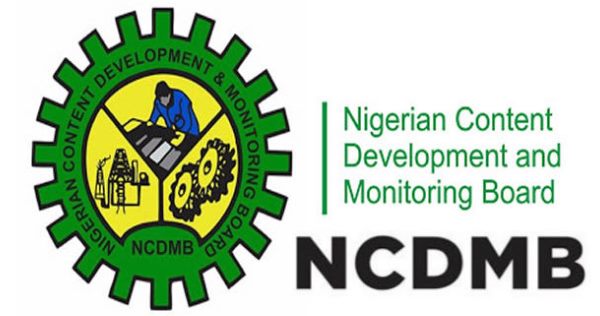News
NCDMB Espouses Benefits of Insurance Industry Collaboration

The Nigeria Content Development Monitoring Board, NCDMB, has craved the understanding and support of the insurance sector to strengthen the Boards desire towards the implementation of the Nigerian Oil and Gas Industry Content Act, NOGICD, in the sector.

Simbi Wabote, the Executive Secretary, ES, of the Board, who made the call at the 2023 Oriental News Nigeria conference in Lagos, with the theme, “Building Local Content Synergy between the Oil and Gas and the Insurance Sector in Nigeria” said over the years, the Board has taken deliberate steps to forge collaboration with various critical stakeholders to support the attainment of its strategic goals and mandate.
Wabote, who was represented by Mr. Daziba Patrick Obah. Director, Corporate Services of NCDMB, said that stakeholders’ engagement and collaboration is one of the key enablers to the Board’s ten-year strategic road map designed to achieve 70 per cent Nigerian content performance by the year 2027.
This he said is the reason for various engagement and collaboration between NCDMB and several MDAs, including the National Insurance Commission, NAICOM which crystalized in the joint issuance of the Insurance Guideline in 2022 to support the implementation of the insurance requirements contained in Sections 49 and 50 of the NOGICD Act 2010.
The main benefit of the guidelines according to Wabote, is the creation of a database of all insurance programs procured by the operators, project promoters, alliance partners, and Nigerian indigenous companies, to enable the Board monitor utilization of in-country insurance capacity thereby enhancing in-country value retention.
“It is worthy to emphasize that collaboration between government agencies is crucial for effective public service delivery through alignments of areas of strength, better decision-making, sharing of resources, optimization of opportunities and better understanding of issues and challenges with policy implementation.
“This ultimately, create huge benefits for both country and citizens, as it enables collaborating agencies to understand and respond to the needs and expectations of Nigerians. In NCDMB, we recognize the importance of collaboration and synergy amongst government organizations and other stakeholders to the fulfilment of our statutory mandate.
The Executive Secretary described the theme of the conference as apt and timely as it underscores the imperative of fostering the much-needed collaboration and synergy amongst MDAs and critical stakeholders; in this case between two critical regulators in the Oil and Gas Industry and the Insurance Industry.
“There is no doubt that Nigeria has not extracted sufficient value across the Nigerian oil and gas industry value chain since the commencement of hydrocarbon mining in Nigeria. It is this very low indigenous participation in the hydrocarbon value-chain in Nigeria that necessitated the enactment of the NOGICD Act in 2010 with the sole aim of deepening local content in the nations’ economy.
“Similarly, the performance of the insurance sector, particularly in relation to oil and gas businesses, is also sub-optimal due to various reasons.” Wabote observed.
Speaking further he said that building synergy between these two critical sectors of our economy holds huge potentials for growth and development of the Nigerian economy, adding, “The summit, therefore, presents a great opportunity for key stakeholders to brainstorm on the benefits and challenges impeding optimal performance in these two critical sectors.
“Furthermore, this summit offers us a strong veritable platform for the Insurance Industry, the Oil and Gas Industries, and other stakeholders to articulate processes, procedures, and practices to forge sustainable collaboration in optimizing opportunities and harnessing benefits for themselves as Nigerians.”
Dwelling more on the legislation, he said that, “In addition to various provisions of the NOGIC Act and the Insurance Act, Sections 49 and 50 of the NOGICD Act specifically provide concrete basis for NCDMB and NAICOM to work together to extract maximal value from both the Insurance and the Oil and Gas Industry for the Nigerian economy.
The Section 49(1) states: “All operators, project promoters, alliance partners and Nigerian indigenous companies engaged in any form of business, operations or contract in the Nigerian oil and gas industry, shall insure all insurable risks related to its oil and gas business, operations or contracts with an insurance company, through an insurance broker registered in Nigeria under the provisions of the Insurance Act as amended”
Also, Section 49(2) states: Each operator in subsection (1) of this section shall submit to the Board, a list of all insurance companies and insurance brokers through which insurance covers were obtained in the past six months, the class of insurance cover obtained, and the expenditures made by the operator while Section 50 states, No insurance risk in the Nigerian oil and gas industry shall be placed offshore without the written approval of the National Insurance Commission which shall ensure that Nigerian local capacity has been fully exhausted.”
Wabote further noted that Section 49 makes it mandatory for operators, project promoters and other entities in the oil and gas industry to obtain insurance coverage for all insurable risks with insurance companies and brokers that are registered in Nigeria in line with the Insurance Act (as amended).
“It is important to note that Section 50 forbids entities in the oil and gas industry from offshore placement of any insurable risks except with the written approval of NAICOM. The essence of these two provisions of the NOGIC Act is to ensure full utilization of available in-country capacity in the insurance sector by oil and gas industry players. The goal ultimately is to promote more capital retention in country and to boost the capacity of Nigerian insurance companies and brokers to support the Nigerian oil and gas industry.
“To give life to these sections of the NOGIC Act, NCDMB and NAICOM set up a Technical Committee which developed the structures and strategies to promote and ease interface between both regulatory institutions.
“One of the tools to ease the interface between the two bodies involved the development of the NOGIC JQS Statutory Reporting Module which makes submission of insurance performance report by oil and gas companies to NCDMB automatically accessible to NAICOM for prompt review and feedback to NCDMB.
“The benefit of this virtual interface is to reduce the turnaround time and to promote the ease of doing business. NCDMB and NAICOM are still fine-tuning the Application Programming Interface to enhance its functionality and efficiency.” he said.
Speaking on seeming, challenges, the ES, said, “Despite the commitment of both agencies to optimize the benefit of the NOGICD Act and the Insurance Act, there are still some obstacles in the way of full implementation.
“One of the challenges of utilizing Nigerian loss adjusters or brokerage firms is the low capital base of the insurance industry. Closely related to it is the capacity of local insurance firms to underwrite the huge loss associated with a typical upstream petroleum project.”
He said, however that in response, NAICOM has made remarkable efforts to mitigate some of these limitations, but a lot still needs to be done.
He added that in the spirit of collaboration, NCDMB is poised to work with NAICOM as a credible partner every inch of the way to get around some of these obstacles particularly within the boundaries of our statutory mandate.
On the way forward he said the Board will not only look at the challenges of building sustainable synergies but will also come up with feasible proposals to encourage collaboration to surmount impediments.
“To address the issue of low capital base of the industry, for example, we call on all stakeholders to support NAICOM to push for an increase in the minimum capital base of insurance companies.
“Secondly, NAICOM and other stakeholders need to also work assiduously to forge and promote mergers of insurance companies to enhance their efficiencies and improve their market share as part of their collective benefits.
“I am aware that some steps have been taken in this direction, but these efforts need to crystallize into reality.” he added.
News
Raji Takes over as NBTI Boss, Pledges to Drive Technological Growth

Dr. Kazeem Kolawole Raji, director general, National Board for Technology Incubation (NBTI), has promised to engage in the empowerment of youths in digital and technological innovations for the nation’s economic growth.

Raji, who stated this when he officially took over the mantle of leadership from immediate past director general, in Abuja, explained that the Board remained an economic base in which the Gross Domestic Product, GDP, of the country could be grown.
He said, “Presently, what we are doing is electromechanical. And I’m bringing new initiatives on emerging technologies. Because when you talk about technology today, you talk about AI, that’s artificial intelligence. You talk about nanotechnology. You talk about blockchain technology. And if you look at what is happening today in Nigeria, you see that a lot of our youths, if you tap their brains, they can become useful to this country and to themselves, rather than engaging in nefarious activities.
“And most importantly, we are a knowledge-based economy where the frontier, top-level elites of most Nigerian youth can be put into place and help drive the economic base of Nigeria, grow our economy, and increase our GDP.”
The director general pointed out that the Board had offices in all 36 states of the Federation and 15 extensions in some states and would ensure grassroots technological advancement.
“First and foremost, let me thank His Excellency President Bola Ahmed Tinubu GCFR for appointing me as the new Director General and CEO of the National Board for Technology Incubation, Abuja. Presently, we have offices in 36 states of the Federation and 15 extensions in other states. That means if you add 36 plus 15, you’d have around 51 centers.”
“These centers are meant to advance technological innovation and skillsets for our youth to enjoy. If you look at it presently, MBTI is tasked with establishing and managing technology incubation centers in Nigeria. And the skillset of most of our youth in Nigeria today shows that many come up with a lot of innovations.”
“Just like very recently, last month in January, in Nigeria, an incubatee of MBTI, Mr. AbdulLateef Olaosebikan, won $1 million in a keenly contested competition in Abu Dhabi. He called that prize the Zaihe Sustainable Prize Award, and he won it in the food category.”
“He competed with 5,980 other applicants from all over the world. That is to show you the kind of skillset in Nigerian youth. And that’s part of the reason why, when Mr. President said he’s going to draw water from the dry well, it means technology. Because the only way you can draw water from a dry well is through technology. And that technology is what I’m here to drive,” he stressed.
On the proper packaging of products, Raji stated that a memorandum of understanding had already been signed with the Kwara State Government in that regard.
“Just last week, I was in Kwara State to sign a memorandum of understanding with the Kwara State government with our incubatees and post-incubatees. One of the things I discovered there is about packaging and how we can package our products so that they can rival international products.”
“Presently, we are engaging with NAFDAC and the Standard Organization of Nigeria to achieve that kind of product quality. Because part of the mandate of MBTI is to commercialize the research products coming out of our incubatees and the National Board for Technology Incubation.”
“So, I can assure you, with the caliber of people at the Standard Organization of Nigeria and NAFDAC, partnering with them, by next week or so, we’ll be engaging with them officially on how we can work together to help our entrepreneurs package their products well in view of international standards.”
“You don’t have to go somewhere else to look for any product. If you see the kind of products coming out of Kwara State, you will marvel. Just very recently, someone came up with the idea of a trytractor.”
“And the trytractor, if you see the kind of output coming from this trytractor, if you help this person commercialize this product, imagine Nigeria as an agrarian nation and how we can make use of this. We won’t need to go outside and import tractors again if we develop our own local entrepreneurs. That is the reason why I’ve always been advocating, even while I was Executive Director at Nigerian Communications Satellite, that Executive Orders 003 and 005 on ICT local content should become an Act of Parliament.”
“It’s not just an Executive Order alone. They need to become an Act of Parliament so that if they become law, Nigerians will embrace our own local technology. We won’t have to go outside to rely on foreign technology.”
“And if you are working on your own local technology, you will be assured that capital flight will become a thing of the past, and we can shore up our foreign reserves and address the fluctuation of the Naira and Exchange Rates today in Nigeria,” Raji further explained.
Earlier, Dr. Chukwu, the immediate past director general of NBTI, said deliberate efforts were made for grassroots development.
“NBTI is an agency that spans the whole nation, and there is a grassroots project that, at the end of the day, if we put in our best, people will be able to benefit from the dividend of democracy. Thank you very much.”
“I am here this morning to start the handing over process, and usually, in the handing over, I’m expected to have inputs from departments, units, zonal offices, and centers to ensure that the handing-over note is comprehensive enough for the incoming DG, CEO.”
“So, on my part, I’ve been able to do a template that will guide the departments, the heads of units, zonal directors, and center managers to submit their inputs. That was what even delayed me a bit. Though I have it in soft copy, for the departments and others, I will give them a hard copy here.”
“Let me also use this opportunity to welcome my brother to the National Board for Technology Incubation. National Board for Technology Incubation is an agency that cuts across the whole nation, and there is a grassroots project that, at the end of the day, if we are able to put in our best, our people will also be able to benefit from the dividend of democracy. Thank you very much,” Chukwu said.
News
WiSolar Offers Base Pay for Nigerian Partners

WiSolar, African provider of solar-as-a-service solutions, has announced a new programme for its Partner Merchants.

The company has implemented a base pay structure for Partner Merchants and collaborated with Ecobank Nigeria to ensure seamless and fast mass disbursements.
This programme, according to the business, is part of WiSolar’s continued efforts to strengthen its merchant network, which drives solar adoption throughout Nigeria.
WiSolar will use Ecobank Nigeria’s digital payment infrastructure to provide rapid and reliable payouts to its increasing network of Partner Merchants.
The arrangement avoids payment delays and gives businesses rapid access to their earnings, according to WiSolar.
It added: “By implementing a base pay, the company ensures that Partner Merchants receive a stable income, complementing their commission-based earnings from solar product sales and installation.”
Preye Irims, service architecture and partner enablement at WiSolar, explained further: “Our Partner Merchants are at the heart of our mission to make clean, affordable solar power accessible to more Nigerians.
“Introducing a base pay is a way of recognizing their efforts and providing financial stability as they help accelerate the transition to solar energy. With Ecobank Nigeria’s support, we are ensuring that payments are processed efficiently and securely.”
News
Binance Chief Insists Some FG Officials, Reps Demand $150m Bribe

Tigran Gambaryan, top official of Binance, at the weekend, maintained his stance on the bribery allegations against some Nigerian government officials and House of Representatives members.

Tigran Gambaryan
Gambaryan insisted Nigerian officials demanded bribes from him despite the denial of the Federal Government.
Recall that Gambaryan, who is Binance’s head of financial crime compliance, was detained in Nigeria from February to October 2024.
Nigerian government said his arrest was part of a broader investigation into alleged money laundering and economic destabilisation attributed to Binance’s activities in Nigeria.
On Friday, while recounting his initial experience on the issue on Twitter, Gambaryan accused some Nigerian lawmakers of demanding substantial bribes in cryptocurrency.
He specifically accused three lawmakers of soliciting a $150 million bribe from him, naming Philip Agbese, Ginger Onwusibe and Peter Akpanke as the three federal legislators who demanded the huge bribe from him to allegedly forestall his arrest and prosecution.
He further alleged that Nuhu Ribadu, National Security Adviser, sought significant payouts from Binance for his political ambition.
But in a swift response, Mohammed Idris, minister of Information and National Orientation, dismissed Gambaryan’s allegations as “outrageous” and “defamatory”.
Idris explained that the Nigerian government had rejected a $5 million offer from Binance intended to secure Gambaryan’s release, opting instead for a more favourable settlement with the US government.
He said Gambaryan’s claims lacked credibility and appeared to be an attempt to discredit Nigerian officials.
But Gambaryan in his latest post on the development on Saturday on his X, said the Federal Government used him as leverage to negotiate a beneficial settlement with the US government.
He wrote, “I was invited by the Nigerian FIU to a meeting in January. Last time I checked, they are part of the Nigerian government. House members also invited us to the meeting. Last time I checked, the legislative branch is also part of the Nigerian government.
“You said the second part was part of a probe? Lol. So when you invited us to a friendly meeting, you even lied about that. I was in a safe house for a month, watching TV, while you were trying to use me as leverage. You then panicked and knowingly charged me with blatantly false accusations.
“So I was released on humanitarian grounds? At least you’re finally admitting the need to release me. Last time you posted, you claimed my health was fine and that there was nothing wrong with me”.
The crypto expert further stated, “You investigated? Yet you didn’t take a statement from me? A person with direct knowledge. What a joke.
“You dragged my name through the mud for the past year with zero evidence against me, nearly killed me, and caused trauma to my family. And now you have the nerve to talk about defamation?
“I’ll put my credibility on the line anytime. In court? You mean like last time, when your attorneys didn’t even show up to the human rights suit in Abuja?
“Get your facts straight. I am done with this foolishness. I said my part. I’ll be off Twitter now since it’s pointless to argue with evil.”
While insisting that his claim was factual despite the denials, Gambaryan added, “What I shared was factual, based on my personal experiences and conversations with those who have direct knowledge of the events I discussed; information that was shared with both Nigerian and US law enforcement.
“So please, allow me to leave this behind and find peace”.
The Binance executive said it was the responsibility of law enforcement agents in both Nigeria and the US to see the investigation into the matter through.
He said he is no longer in law enforcement, adding that the responsibility of seeing this through to a logical conclusion now falls on those still serving in the United States and Nigeria.
He added, “Many requested that I stay on and provide further commentary on the issues I posted about yesterday (Friday). Here’s the hard truth: what I shared was meant to fill in the gaps left by Wired and NPR’s reporting.
“The reality is that last year was incredibly painful for me and my family. I dedicated my life to fighting crime as a Special Agent with the United States Department of the Treasury and as a compliance professional. It was an honour to serve my country and it was a blessing that they came to my rescue and mobilised the full force of the US Government when I was in need.
“Being dragged through court on “outrageous, baseless, and trumped-up charges”, he posited, “didn’t just hurt me but also brought immense pain to my family.
“I don’t want to see my kids cry because I’m not around. I don’t want to see videos of my 75-year-old mother on television in tears. I don’t want to see my wife crying on TV. I want to put this nightmare behind me and move on.”

 E-Financial2 days ago
E-Financial2 days agoSERAP Gives CBN 48-Hour Ultimatum to Withdraw ATM Fee Hike

 E-Financial2 days ago
E-Financial2 days agoFG Seeks Fresh $300m Loan from World Bank for Health Security

 General News2 days ago
General News2 days agoFG Drops Merger of NCAA, NAMA

 News2 days ago
News2 days agoBinance Chief Insists Some FG Officials, Reps Demand $150m Bribe

 News2 days ago
News2 days agoinDrive Unveils Cashless Bank Transfer Feature in Nigeria

 Telecom20 hours ago
Telecom20 hours agoToriola, MTN Nigeria CEO again Defends Tariff Hikes amidst Backlash

 E-Financial2 days ago
E-Financial2 days agoCardinalStone Acquires Radix Pension Managers

 Telecom2 days ago
Telecom2 days agoNITDA Pledges to Foster Innovation with Cloud Infrastructure and AI Applications






















